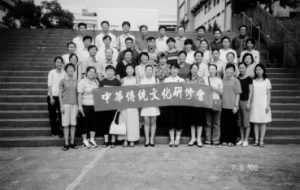The Shatin campus was completed in 1973, with a total of six buildings. The College began to move in in July. The premises included Cheng Ming Building for administration and teaching, Humanities Building for teaching, Staff Student Centre – Leung Hung Kee Building for teacher and student activities, Ch’ien Mu Library, Friendship Lodge for staff and visiting scholars, and Chih Hsing Hall for student dormitory. Three additional dormitories were later built due to the increase of student number, namely, Xuesi Hall (1978), Grace Tien Hall (1982), and Daisy Li Hall (2003).
In 1976, the Legislative Council of Hong Kong passed the “Chinese University of Hong Kong Ordinance 1976” in the third reading. The original teaching, personnel, finance, and other powers of the College were reserved for the university, and the title of “President” of New Asia College was also changed to “College Head”. Each constituent college is responsible for “student-based” teaching. To adapt to the restructuring, the College has inaugurated the “Assembly of Fellows,” which is the most important decision-making organisation of the College, and is chaired by the College Head. The position of the College Secretary is set up, and is in charge of the general affairs of the College. The College is still committed to organising biweekly assemblies, general education courses, academic lectures and seminars, exchange and mutual visit programmes, the publication of the monthly journal New Asia Life, and New Asia College Academic Bulletin, and the promotion of various academic activities. It is the College’s mission to enhance students’ campus life.
In 1978, the College initiated the “Ch’ien Mu Lecture in History and Culture Fund” to invite world-renowned scholars to give lectures every year. The Ch’ien Mu Lecture has become an annual major event. In later days, “The New Asia S. Y. Chung Visiting Fellows Programme”, “Mingyu Culture Foundation,” “David Lam Economic Visiting Scholar Exchange Programme,” and “The Hui Yeung Shing Exchange Programme in Fine Arts” were launched. In 2007, the “Yu Ying-Shih Lecture in History” was co-organised with Chung Chi College. In recent years, the “New Asia Lectures on Contemporary China,” and the “New Asia Lectures on Confucianism” have been organised to promote academic exchanges and to enrich the academic and cultural life in campus. In order to advance traditional Chinese culture, since 2000, principals and teachers of primary and secondary schools from the Mainland, Taiwan, Hong Kong, and Macao have been invited to participate in the “Seminar on Chinese Moral Education,” and the “Seminar on Traditional Chinese Culture” every summer.
In order to broaden the horizons of students, the College has co-organised exchange programmes, summer courses, social service experience programmes, leadership training and language improvement courses with various renowned overseas universities. The number of students in New Asia College has also been increasing, from 42 in 1949 to about 3,000 in 2013, which reflected the tremendous development of New Asia College.
 |
 |
 |
 |
 |
 |
 |
 |
 |
 |